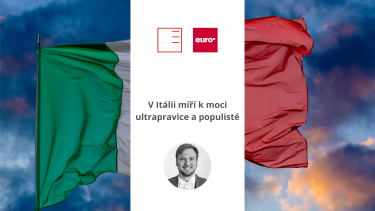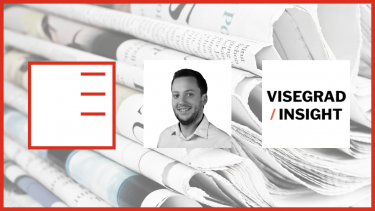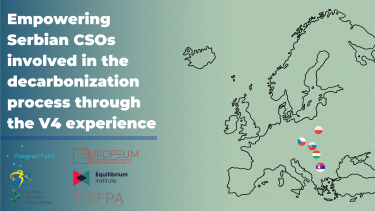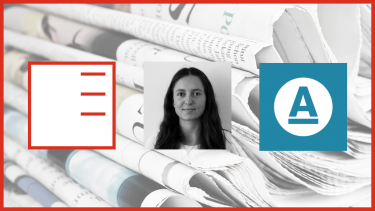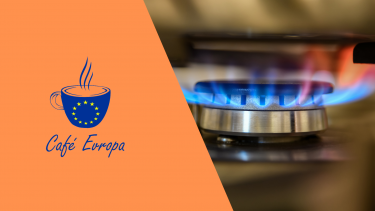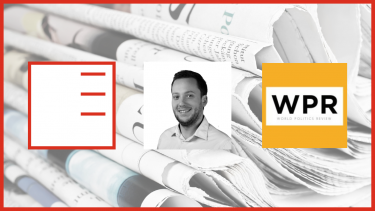Týdeník Euro: The far-right and populists are coming to power in Italy
Due to the premature fall of Draghi's government, Italians will go to the polls on Sunday 25 September. At stake, among other things, is how Rome will deal with the €200 billion covid bailout. Our research associate Alexandre Lagazzi has commented on the current situation.
Show more
EURO: Uncertain heating season opens the return of coal
Our senior research fellow Kateřina Davidová commented for the weekly magazine Euro on the topic "Uncertain heating season opens the return of coal". In her commentary, she discusses Europe's energy self-sufficiency and, among other things, the current and future state of the Czech energy sector without coal.
Show more
RTVS: Some EU countries are returning to coal energy
The return of coal as a source of electricity production is a direct consequence of the Russian aggression in Ukraine. The resumption of coal-fired power stations in Europe means an increase in harmful emissions, jeopardizing the EU's climate targets. EUROPEUM Institute researcher Kateřina Davidová spoke in detail about the energy crisis in Europe, the measures that Brussels is taking to prevent countries from turning to sources of electricity such as coal, and the compensatory measures taken by member states.
Show more
Visegrad Insight: Slovenia’s New Government Rejects ‘Orbán’s Visegrad’
The head of our Brussels office, Žiga Faktor, commented for Visegrad Insight. Žiga Faktor points out that the centre-left opposition parties united in an informal coalition known as the "Constitutional Arch Coalition" have not coordinated as closely as the opposition parties in the Czech Republic, which have formed two coalition blocs, the centre-right SPOLU and the centrist PirStan.
Show more
Empowering Serbian CSOs involved in the decarbonization process through the V4 experience
The project focuses on strengthening civil society organizations in Serbia towards more successful advocacy and enhanced participation in policymaking within the area of green transformation with a particular focus on coal phase-out.
Show more PDF
Aktuálně.cz: How to reduce dependence on Russia: Europe and others tackle gas, oil and coal cuts
Our researcher, Kateřina Davidová, commented for Aktuálně.cz on the latest package of sanctions against Russia by the European Union. According to her, the biggest impact on the Russian economy would be the restriction or ban on the purchase of mineral resources from the largest European customers or even from the whole European union. The best alternative to these energies would be to switch to renewable energy sources, says Kateřina Davidová.
Show more
INVITATION: DIGITAL WORLD – A BOON OR A FRONTLINE?
EUROPEUM Institute for European Policy and The Centre for European Perspective – CEP invite you to a hybrid event: DIGITAL WORLD – A BOON OR A FRONTLINE? The event will take place on Tuesday, 5 April at 10:30 in Prague Creative Centre, room 219, or online on our Facebook page.
Show moreINVITATION: Café Evropa online: The future of European energy - how to ensure stable and clean energy sources without Russia?
We would like to invite you to the Café Evropa debate on 21 March at 17:30 on the topic "The future of European energy - how to ensure stable and clean energy sources without Russia?". The Russian invasion of Ukraine has, among other things, further fuelled the question of energy security in the Czech Republic and the EU and the future of energy in our country. The current security situation points to the need to diversify energy sources as soon as possible, i.e. to secure energy supplies from different regions and countries in order to avoid excessive dependence on Russia. There are also views in the public debate that coal extraction could be temporarily increased, which would enable some countries to cover any shortfalls in resources. Is a complete or even partial halt of Russian gas supplies to the Czech Republic and the European Union a realistic option? What impact would this have on our energy security? How much further increase in energy prices can we expect in this case? How should EU countries react and help households and industry cope with the expected increase? Could a possible temporary increase in coal extraction mean a return to fossil fuels and the end of the EU's climate ambitions? Or could the current problematic situation further accelerate the energy transition?
Show moreWorld Politics Review: Germany’s New Government Could Spell Trouble for the Visegrad Four
The director of our Brussel's office, Žiga Faktor, gave a commentary to World Politics Review on their new article Germany's New Government Could Spell Trouble for the Visegrad Four. The New German Government had been getting positive reviews even before it took office in early December. But not everyone is pleased with the new coalition government, one of which is Viktor Orban.
Show more
e15.cz: What Merkel's successors are planning: wage increase, digitalization and continuation of Nord Stream 2
What will the new government do for the environment? And how are German-Russian relations likely to develop? Our research associate Tereza Novotná and the institute's director Zdeněk Beránek contributed to this article on what the future German coalition is up to.
Show more

Staroměstské náměstí 4/1
Prague 1 - Staré Město
110 00
tel.: +420 212 246 552
email: europeum@europeum.org
https://www.europeum.org
